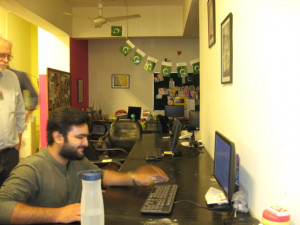
I gave a report to KBOO Staff on my Professional development Exchange in Pakistan with ICFJ in September 2016
I wanted to stress the need for better tools to measure the impact our social justice journalism. I soon realized,in going over my notes, that the first hurdle is to ask people to be mindful of the concept. Why report anything at all if it is not going to influence someone into a reaction of some sort? Why did a contingent of our group feel like it was important to ask nearly every presenter what was "being done to increase security" or "what is being done about the TTP(terror group)"? This question, in my opinion, often times derailed the topic of the presentation. After all there is a "national plan" and a specific protocol under which the government, military and to some extent, media is operating under (from Media Matters meeting).Journalists could look at these plans and sculpt better direct questions.Why do journalists forego reading the report and just ask this random question to people whose area of expertise is so pointed beyond the broadness of the question. Indeed what is anyone in the world doing to keep themselves safe? In the I want to know why this almost rhetorical question is the model for American journalists. Next to the second most logical question (sarcasm) "who knew you could get Crepes in Karachi'? (the online content guy at Dawn actually chided us Americans for only reporting on Terror and Tourism). Pakistani journalists seem to be much better informed about the world around them and the agencies at work or those in a dysfunctional state.
To swing that around to Portland, Oregon and why being mindful of the impact of the journalism we do. If we continue to ask the question “why isn’t the mayor doing more to provide hygienic supplies and services to the homeless in the our city?” instead of actually looking into the agency that is responsible for recycling (Metro), vector control (Multnohmah and Clackamas County), hazardous waste clean up (again Metro) it is not only propagating the release of bad information but it is actually the origin of bad information because people are not doing their research before they ask the questions. Journalists can also look back to the point in time when city clean up became a matter of a private contract.
Who listens to KBOO? We don’t rely on ad dollars so we know that individual listeners give money, presumably because they listen. At KBOO we sponsor many events, cultural and political so we can tell who is listening by the turn out to these events. Download data from our website shows how people listen online. We can count tweets and “thumbs ups”. A more sophisticated example from Pakistan: The Media Lab of MIT is working with think tank Alef Alain in Pakistan to develop cloud sourcing data from media reports to see if certain messaging is taking hold. That is a very expensive way to find out who is listening but one that Alif Alain donors felt was worthwhile and in a word:cool. This translates into an understanding of community needs through press coverage. A more low tech version is one going into it's 20th year at UKS. This research group went through publications in Pakistan with a fine toothed comb to assess media portrayal of women in Pakistan. Now, because of this work Tasneem Ahmar has precitcally written style sheets for every major publicaiton in Pakistan and NGOs world wide advocating for positive discrimination and affermative action in reporting on women. We need that in the US, badly. The KBOO equivalent for me was when I was at an off-the-record meeting with Portland’s BES and Portland Harbor Community Coalition members, a reporter for a local paper told me that he listened to my reports on the Portland Harbor for background on his article. If I had stuck to the press releases of government agencies and uninformed questions and a ten minute blurb there wouldn’t have been a story to write! Development director Rebecca says we are getting our Nilson reports soon. However, beyond making funders happy, let’s get behind those who are using innovation and good technology to find the heart of that which matters most: safety,education,harmony and the sustainability of those things.
I wanted to stress the need for better tools to measure the impact our social justice journalism.
I didn’t get to touch on these things to the staff at KBOO. I am glad I wrote it out here. In all fairness I did talk about security in Pakistan and Pakistan’s public image and relationship with India which took up way too much time. I was upset after I left the meeting because I fell into the trap of reporting for the salacious fear monger in all of us. When I have time I will try to reflect on why that happens. I did get to touch on the vibrancy and intelligence of the Pakistani media. I hope that I conveyed the importance for good information in both places.

